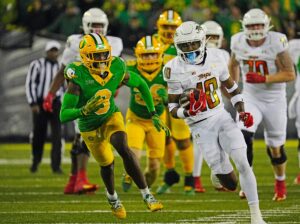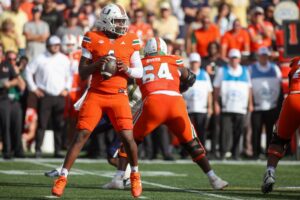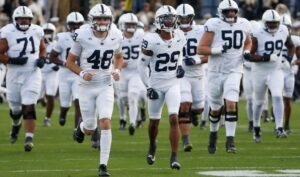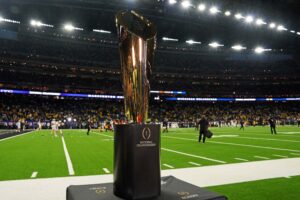The Associated Press has reported that the United States Supreme Court will not hear the NCAA’s appeal of the Ed O’Bannon case, closing the book on the case and creating many speculative possibilities for the future of major college athletics in the United States.
What’s certain is that the ruling of the US Ninth Circuit Court stands, which technically was a ruling for the plaintiffs and against the NCAA. The Ninth found that the NCAA was in violation of federal antitrust laws by imposing amateurism rules that prevented its member institutions from compensating athletes above and beyond the cost of attendance.
What the Supreme Court’s Rejection of the NCAA’s Appeal of the Ed O’Bannon Case Could Mean
Exactly how that ruling will be applied to everyday situations for both athletes and their respective schools’ athletic programs is still up in the air, however, and is likely to be decided by further litigation.
The Supreme Court also rejected a separate appeal by the plaintiffs that would have effectively forced the NCAA to establish a plan for paying football and men’s basketball players.
Included in the Ninth’s ruling was language stating that while the NCAA does not get an antitrust exemption similar to that which Major League Baseball and the National Football League enjoy, there is a difference in the Court’s opinion between funds dispensed to the athletes related to their education and cash payments solely related to their athletic performance.
The Effects on the NCAA
In simple language, the NCAA isn’t a “legal monopoly” but they don’t have to pay athletes cash for their play, either.
While no substantial changes to the current system are in sight right now, ongoing litigation may change that scenario.
The reality that the NCAA wanted to avoid in its appeal to the Supreme Court is that a legal precedent has now been set which is favorable to current and future litigation which alleges that athletes have been damaged by the NCAA’s amateurism rules.
Jenkins v. NCAA
One such case currently in the court system is Jenkins v. NCAA, originally filed in 2014 and currently being heard in the U.S. District Court for the Northern District of California.
Other factors besides the O’Bannon ruling look favorable for the plaintiff in Jenkins. The same district court that originally heard the O’Bannon case is hearing Jenkins and the judge who presided over O’Bannon is in the same position in Jenkins.
Jenkins takes the premise of O’Bannon in a different direction. The suit alleges that the NCAA’s amateurism rules are violating federal antitrust laws by barring universities from competing with each other for the services of prospective athletes.
Current System
In the current system, athletic scholarships are limited to covering only the federally-dictated full cost of attendance for prospective athletes. While there is differentiation between institutions in regards to facilities, personnel and various qualities of academic/athletic programs, the monetary portion offered to recruits is virtually identical.
An optimally successful result of Jenkins would remove those NCAA regulations and allow institutions to use all of their financial resources to attract recruits. In short, a free agency system for major college athletics would be created.
When the district court hands down a ruling in Jenkins, the side that loses the case is likely to appeal. Thus the Supreme Court could find itself with a chance to hear a case deciding the future of major college athletics again. Future litigation among similar lines could follow the same path.
O’Bannon may be fodder for the legal records now, but the future framework of major college athletics is yet to be decided in court. The Supreme Court may yet have its say in shaping those policies.
Main Photo:






